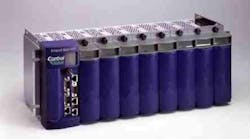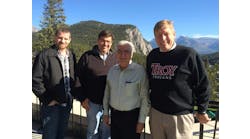Process control applications often demand a mix of discrete and analog control along with a healthy dose of communication capabilities. PLCs excel at discrete control, but often fall short with respect to analog control and communications. The DCS can satisfy the technical requirements of most applications, but often at prohibitive cost.
Bristol Babcock calls its ControlWave product a process automation controller, and most readers will categorize it as a hybrid controller. Like other hybrids, ControlWave resembles a PLC but has added connectivity options, power, and functionality.
ControlWave, which has been around since January 2001, complements Bristol Babcocks Network 3000 process control products and contains features that facilitate upgrades to and coexistence with that system. "We selected ControlWave because of easy integration with their 33xx series, which make up nearly all the controllers in our system," says Abraham Penner, superintendent of instrumentation and control systems with Denver Water in Denver.
End users say Bristol Babock's ControWave is powerful, appears reliable, and integrates well with the company's Network 3000.
Users report satisfaction with ControlWave in the brief time its been in use, and they expect long-term reliability will match that of the Network 3000 products. They also give kudos to ControlWave Designer programming software, which is used to program ControlWave as well as Network 3000 controllers. The software incorporates Bristols Accol III custom control modules and allows programming in any of the five of the IEC 61131-3 controller programming languages.
"Bristol has effectively interwoven the Accol functionality of the 3000 series controllers into the IEC 61131-3 standard open language," reports Scott Christie, process control specialist II with Denver Water.
Denver Water standardized on Bristol Babcocks 3000 series controllers in 1982, and the utility purchased its first ControlWave products in October 2001. Denver Water uses ControlWave extensively in water/wastewater treatment and water distribution applications and also for generator control. Bristol Babcock control systems installed at Denver Water control and monitor over 10,000 I/O points.
The Parker Water & Sanitation District in Parker, Colo., is a longtime Bristol Babcock customer and is just finishing its first ControlWave installation. The application is a new wellhouse controlling wells, booster pumps, and chlorinators. Remote I/O blocks, connected via fiber, monitor and control a remote well site 3,000 ft. from the wellhouse.
Parker Water does not have much operating experience with ControlWave hardware, but the engineers think highly of Designer software, which theyve used extensively. "The Designer software is complete and mostly intuitive, but don't expect to jump right into Designer without some training. There is a learning curve as with any other robust package," says Doug Jackson, a SCADA/process control specialist with Parker.
"Designer is well thought-out and allows the programmer more latitude than I have ever experienced outside of C or Fortran," he adds. "I like Designers program simulator for catching bugs. The function blocks programmed in structured text plug nicely into ladder logic which is preferred by our electricians for diagnostics."
Denver Water personnel also praise Designer software. "ControlWaves best features are its support for programming in multiple languages, the ability to create standard libraries that can be referenced in subsequent projects, and the ability to debug code on-line," says Garth Rygh, plant supervisor at Denver Waters Marston Water Treatment Plant.
Eldridge Engineering (www.opcsystems.com) has performed numerous control system integration tasks for Denver Water. President Ken Eldridge also appreciates the power of the Designer software. "The IEC 61131-3 programming standard provides the ability to choose the most efficient and effective programming language. Programming features allow full implementation of object oriented programming through the use of arrays, indirection, and complex data structures".
The City of Newport Beach in Newport Beach, Calif. has been using ControlWave in its wastewater lift stations for one year. "Designer is really a great piece of software. I have saved considerable time and money using the simulator. Within seconds I can tell if my control strategy in going to work or not," reports Jeff Kerr, utilities control technician with the City of Newport Beach.
ControlWave provides a major upgrade over Network 3000 controllers in terms of processing power, and this power is needed in certain critical applications. "Our first ControlWave unit replaced a mechanical governor for control of a hydroturbine generator. The mechanical cam function was replaced with a ten term polynomial which keeps the hydroturbine at peak efficiency at all levels of operation," says Christie of Denver Water.
"Control of blade pitch angles is now continuous rather than stepped for greater smoothness of operation and less wear on servos and bearings," Christie continues. "The ControlWave unit has increased efficiency approximately 10%, and the complete program cycle time is only 50 msec."
Indeed, Bristol Babcock products are often used in SCADA applications, and these applications often need low-cost and low-power RTUs. "ControlWaves LP [a low-power version] is too much for some of our distribution locations. This increases the cost per I/O and leaves the LP underutilized," according to Penner of Denver Water. To address these application needs, Bristol plans to add a new low cost, low power SCADA RTU to the ControlWave family of products this summer.
"Our experience shows Bristols 3000 series products are rock-solid, and we expect the same reliability from ControlWave," observes Bill Hester, PE, an electrical engineer with Denver Water.
For more information call 860/945-2295 or see www.controlwave.com.




